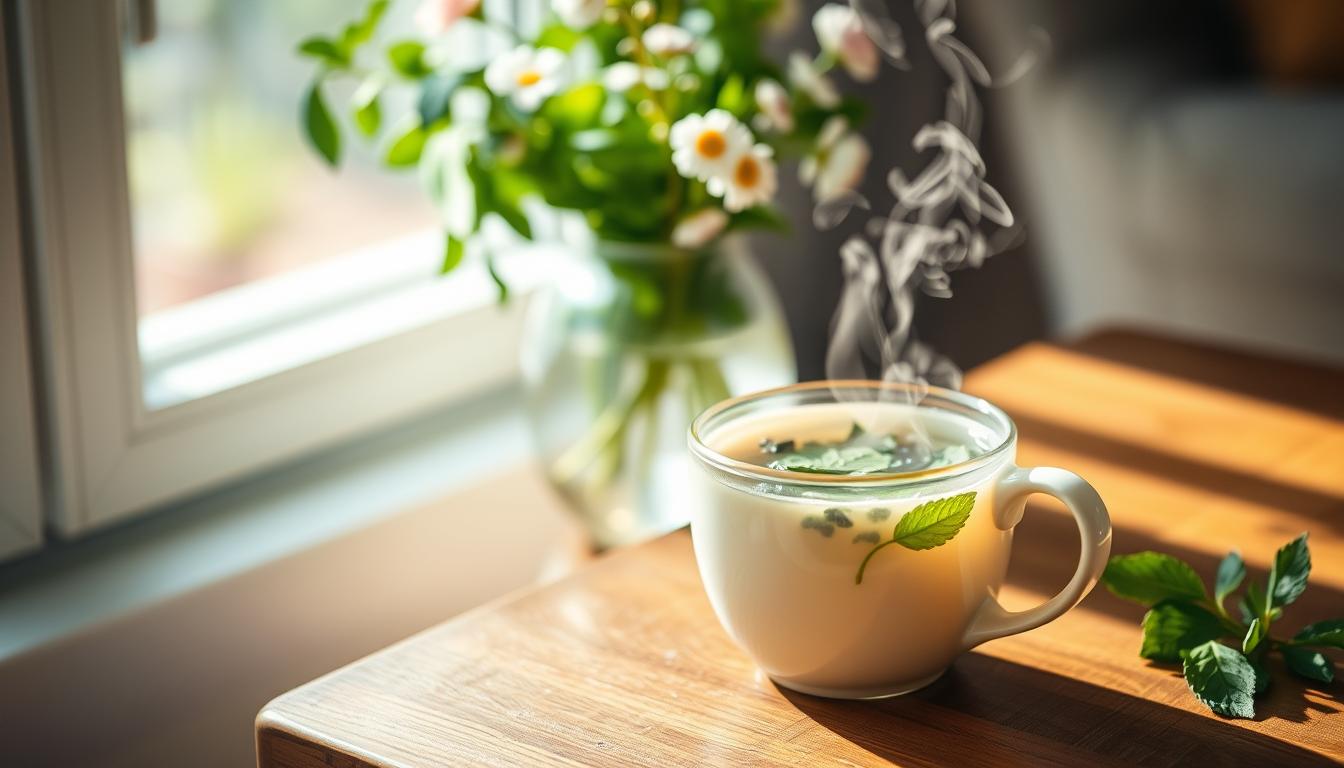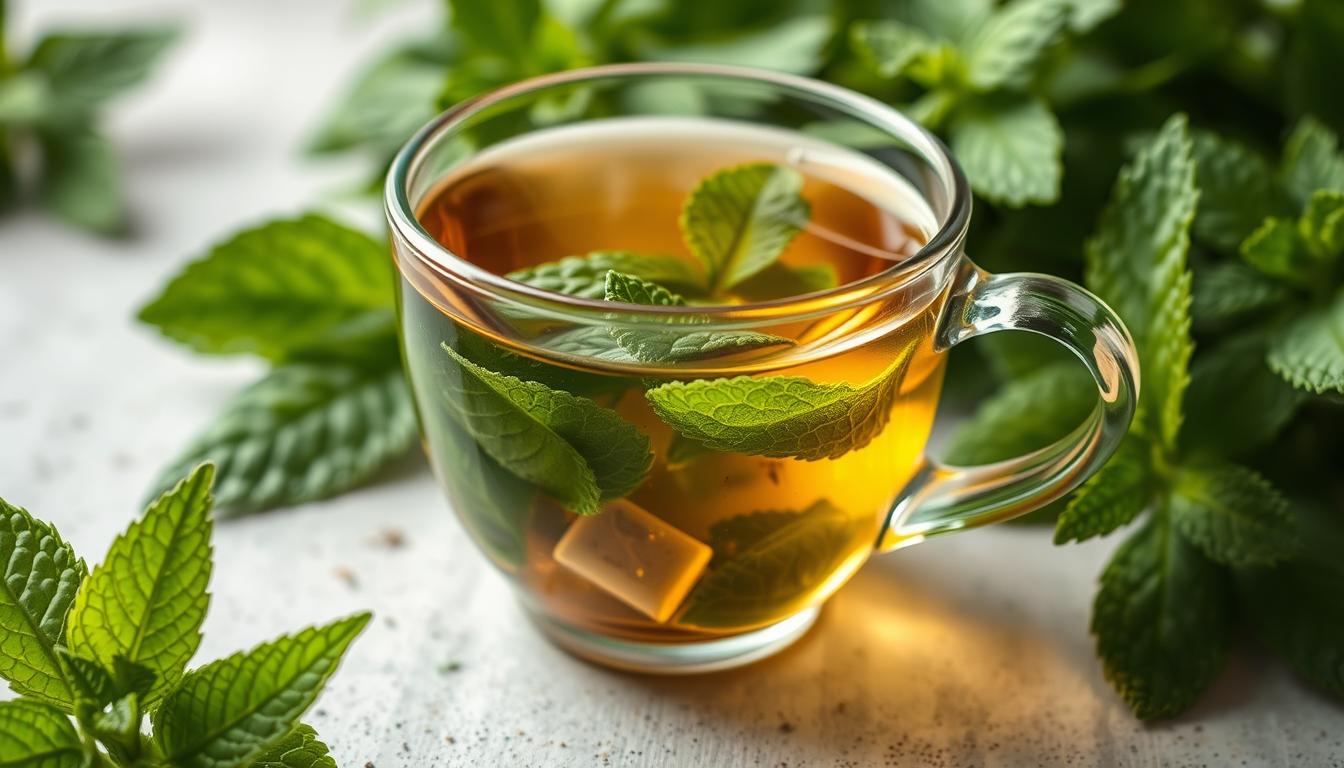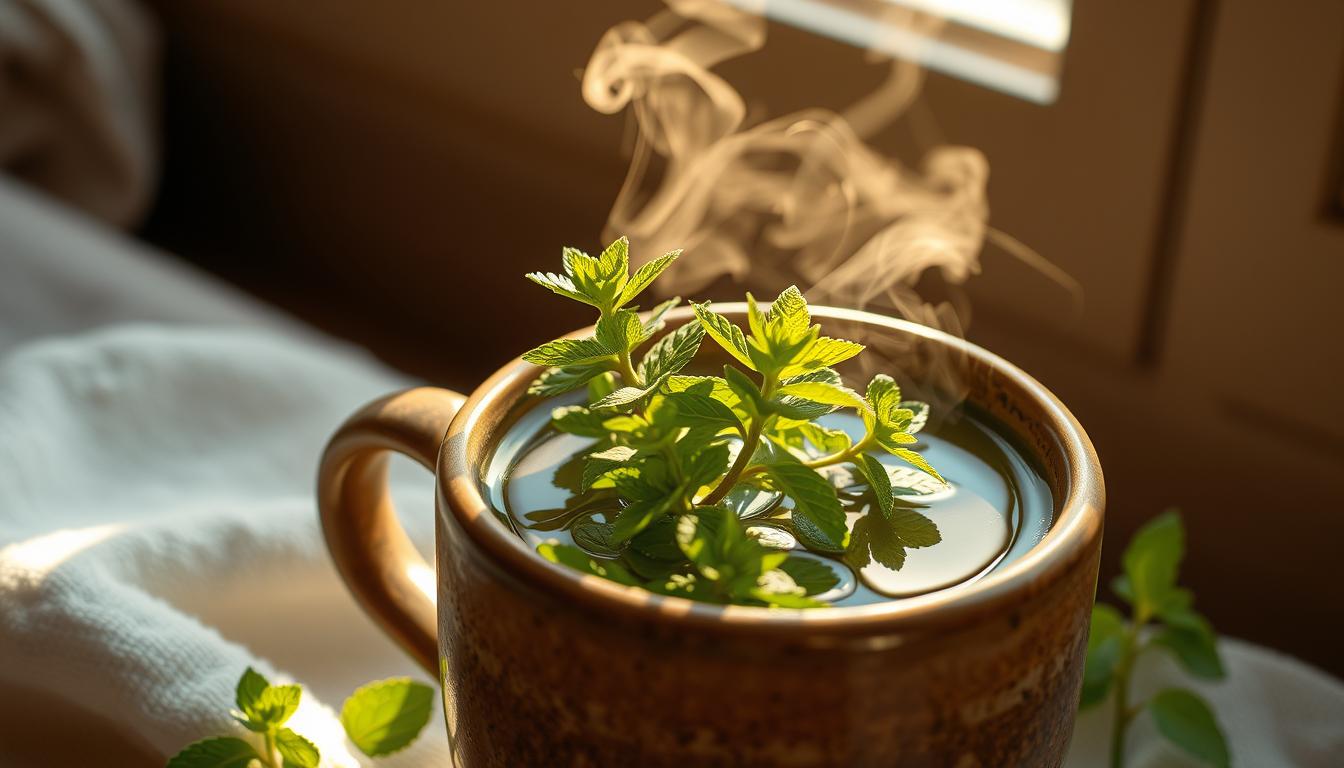Did you know that over 158 million Americans drink tea daily? This soothing beverage has been a favorite for centuries, offering comfort and hydration. For many expecting mothers, a warm cup of tea can feel like a moment of calm in a busy day. But when it comes to pregnancy, not all teas are created equal.
Herbal teas, like peppermint, are often chosen for their refreshing taste and potential health benefits. Peppermint tea, in particular, is known to help with nausea and vomiting, which are common in the first trimester. However, questions about its safety arise due to the potency of certain plants.
Experts, including Dr. Layan Alrahmani, recommend moderation and consulting a healthcare provider before consuming herbal teas. Factors like caffeine content, sugar levels, and herbal strength play a role in determining what’s best for you and your baby. This article dives into the details, helping you make informed choices about your tea habits during this special time.
Key Takeaways
- Tea has been a popular, soothing beverage for centuries.
- Peppermint tea may help with nausea and vomiting in the first trimester.
- Consult a healthcare provider before consuming herbal teas.
- Moderation is key when drinking tea during pregnancy.
- Consider factors like caffeine, sugar, and herbal potency.
Overview of Tea and Herbal Use During Pregnancy
Herbal teas have become a go-to choice for many expecting mothers worldwide. These beverages are celebrated for their natural properties and ability to provide comfort during a transformative time. From easing morning sickness to promoting hydration, herbal teas offer a range of benefits that appeal to pregnant women.

Benefits of Tea Consumption for Expecting Mothers
Herbal teas are rich in antioxidants, which help combat oxidative stress and support overall health. For pregnant women, these teas can also aid in hydration, a crucial factor during pregnancy. Additionally, certain herbs, like ginger and peppermint, are known to alleviate nausea and other common symptoms.
Many expecting mothers prefer herbal teas over coffee due to their lower caffeine content. This makes them a safer and more soothing option for daily consumption. The calming effects of herbal teas can also help reduce stress, which is beneficial for both mother and baby.
General Considerations When Choosing Herbal Teas
While herbal teas offer numerous benefits, it’s essential to choose them wisely. Experts recommend moderation and consulting a healthcare provider before incorporating any new herbal product into your routine. Some herbs may have potent effects that could be unsuitable for pregnancy.
Cultural practices around the world highlight the diverse use of herbal teas. However, safety ratings from medical advisory boards should always be considered. Being informed about the ingredients and their potential impact is key to making the best choices for you and your baby.
Ultimately, herbal teas can be a wonderful addition to a pregnant woman’s diet when selected with care. Always prioritize safety and consult your healthcare provider to ensure the best outcomes for your pregnancy.
Is mint tea safe during pregnancy
Many expecting mothers turn to herbal remedies for comfort and relief. Among these, peppermint infusions are often chosen for their refreshing taste and potential health benefits. Known for its calming properties, this herbal drink can help ease digestive discomfort and nausea, which are common in the first trimester.

Potential Benefits of Mint Tea
Peppermint infusions are celebrated for their ability to soothe the stomach. They can reduce bloating, gas, and indigestion, making them a favorite for digestive health. Additionally, the refreshing aroma and flavor may help alleviate nausea, a frequent concern for pregnant women.
Studies suggest that peppermint has antispasmodic properties, which can relax the muscles of the digestive tract. This makes it a natural choice for those seeking relief from abdominal discomfort. However, it’s important to note that research on its specific effects during pregnancy is limited.
Risks and Safety Concerns
While peppermint infusions offer benefits, they may not be suitable for everyone. Some women report experiencing heartburn after consumption, as peppermint can relax the lower esophageal sphincter. This allows stomach acid to rise, causing discomfort.
There’s also the potential for interactions with certain medications. If you’re taking prescribed drugs, consult your healthcare provider before adding peppermint infusions to your routine. Limited studies exist on its long-term effects, so moderation is key.
| Benefits | Risks |
|---|---|
| Eases nausea and vomiting | May cause heartburn |
| Reduces bloating and gas | Potential medication interactions |
| Calms digestive muscles | Limited research on long-term effects |
Always consult your healthcare provider to ensure this herbal drink is a safe choice for you. Personalized advice can help you make the best decision for your health and your baby’s well-being.
Guidelines for Safe Tea Consumption During Pregnancy
Choosing the right beverages can make a big difference for expecting mothers. Moderation and mindfulness are key when it comes to enjoying your favorite drinks. This section outlines practical tips to ensure your beverage choices support your health and your baby’s well-being.
Caffeine and Sugar Considerations
Monitoring caffeine intake is crucial during this time. Experts recommend keeping daily consumption under 200 mg. This amount helps reduce risks like low birth weight or preterm labor. Be mindful of sources like coffee, soda, and even certain teas.
Sugar moderation is equally important. Bottled or specialty drinks often contain high sugar levels, which can lead to unnecessary weight gain. Opt for unsweetened versions or natural sweeteners like honey in small amounts.
Steeping times also matter. Longer steeping can increase caffeine content in your cup. For green tea, a popular choice, limit steeping to 2-3 minutes to control caffeine levels. This practice ensures you enjoy your drink without overdoing it.
| Guideline | Recommendation |
|---|---|
| Caffeine Intake | Keep under 200 mg daily |
| Sugar Levels | Choose unsweetened or lightly sweetened options |
| Steeping Time | Limit to 2-3 minutes for green tea |
Following these recommendations can help you avoid unwanted side effects. Always consult your healthcare provider for personalized advice. Making informed choices ensures a healthier and more comfortable pregnancy journey.
Common Teas and Their Effects on Pregnancy
Exploring the world of herbal drinks can provide comfort and relief during pregnancy. Each herb offers unique benefits, but understanding their effects is crucial for making informed choices. From soothing nausea to preparing for labor, these beverages can play a supportive role in your journey.
Ginger and Peppermint Tea Insights
Ginger is widely recognized for its ability to ease nausea, a common concern in the first trimester. Studies suggest that consuming 1-1.5 grams of ginger daily can significantly reduce symptoms. However, moderation is key, as excessive amounts may lead to heartburn or other discomforts.
Peppermint, another popular choice, is known for its refreshing flavor and digestive benefits. It can help alleviate bloating and gas, making it a favorite for many expecting mothers. However, some women may experience heartburn after consumption, so it’s best to monitor your body’s response.
Green, Black, and White Tea Considerations
While herbal infusions are often preferred, traditional teas like green, black, and white varieties also have their place. These options contain caffeine, so it’s essential to limit intake to avoid potential risks. Green tea, for example, is rich in antioxidants but should be steeped for only 2-3 minutes to control caffeine levels.
Raspberry leaf has been historically used to prepare the body for labor. Many women consume it in the third trimester to strengthen uterine muscles. However, consult your healthcare provider before incorporating it into your routine.
Chamomile, though calming, has sparked debate due to its potential effects on hormone levels. While some studies suggest it’s safe, others recommend caution. Always seek professional advice before trying new herbal remedies.
Herbal Tea Considerations and Interactions
Understanding the interactions between herbal teas and medications is essential for expecting mothers. Herbal ingredients can vary widely in potency, and their effects on the body may differ significantly. This makes it crucial to approach herbal remedies with caution, especially when combined with prescribed treatments.
Herbal Ingredients and Their Potency
Active components in herbal teas interact with the body at a molecular level. Some herbs, like ginger and peppermint, are known for their mild effects. Others, such as valerian root or black cohosh, can be more potent and may pose risks if consumed in large quantities.
Potency variance among herbs is influenced by factors like growing conditions and preparation methods. For example, dried herbs often have a higher concentration of active ingredients compared to fresh ones. This variability underscores the importance of moderation and informed choices.
Medication Interactions and Expert Advice
Combining herbal teas with certain medications can lead to unintended side effects. For instance, herbal medicine like St. John’s Wort may interfere with antidepressants, reducing their effectiveness. Similarly, chamomile can enhance the sedative effects of sleep aids, potentially causing excessive drowsiness.
Studies highlight the need for caution when integrating herbal remedies into a routine that includes prescribed treatments. Always consult your healthcare provider to ensure compatibility and avoid adverse effects on maternal health.
Here are some tips for safely incorporating herbal teas into your diet:
- Research the active ingredients in your chosen herbal tea.
- Start with small amounts to gauge your body’s response.
- Discuss any herbal remedies with your healthcare provider before use.
By staying informed and seeking expert advice, you can enjoy the benefits of herbal teas while minimizing risks. This approach ensures a healthier and more comfortable pregnancy journey.
Scientific Research and Expert Recommendations
Scientific studies offer valuable insights into the effects of herbal teas on expecting mothers. Understanding the evidence helps women make informed decisions about their beverage choices. Research plays a critical role in determining which options are considered safe and which may pose risks.
Evidence from Clinical Studies and Reviews
Clinical reviews highlight the benefits and potential concerns of herbal teas. For example, studies suggest that ginger can reduce nausea, while peppermint may ease digestive discomfort. However, the safety of certain herbs remains under investigation.
Multinational studies provide statistical analyses relevant to women’s health. These findings help identify patterns and potential risks, such as the link between excessive consumption and miscarriage. Ongoing research aims to clarify these associations.
Guidance from Obstetricians and Herbal Experts
Obstetricians emphasize moderation and caution when consuming herbal teas. Dr. Jane Smith, a leading expert, advises, “Always consult your healthcare provider before trying new remedies. What works for one woman may not be suitable for another.”
Herbal experts also recommend researching active ingredients. Some herbs, like raspberry leaf, are traditionally used in the third trimester. However, their effects on uterine muscles require further study.
| Herbal Tea | Potential Benefits | Risks |
|---|---|---|
| Ginger | Reduces nausea | May cause heartburn |
| Peppermint | Eases digestion | Possible heartburn |
| Raspberry Leaf | Strengthens uterine muscles | Limited research |
Balanced viewpoints from experts ensure that women receive comprehensive guidance. By staying informed and seeking professional advice, expecting mothers can enjoy herbal teas safely.
Conclusion
Herbal infusions can be a comforting choice for expecting mothers, but understanding their effects is vital. While options like raspberry leaf may support uterine health, others could pose a risk if consumed excessively. Benefits such as hydration and relief from vomit or nausea make these beverages appealing. However, potential concerns like preterm birth or adverse interactions with medications highlight the need for caution.
Always consult your healthcare provider before incorporating herbal infusions into your routine. Personalized advice ensures the best outcomes for both mother and baby. Moderation and awareness of ingredient potency are key to making safe choices.
By staying informed and referring to reputable sources, you can enjoy herbal infusions responsibly. Making educated decisions supports maternal and fetal well-being, ensuring a healthier journey for both.

